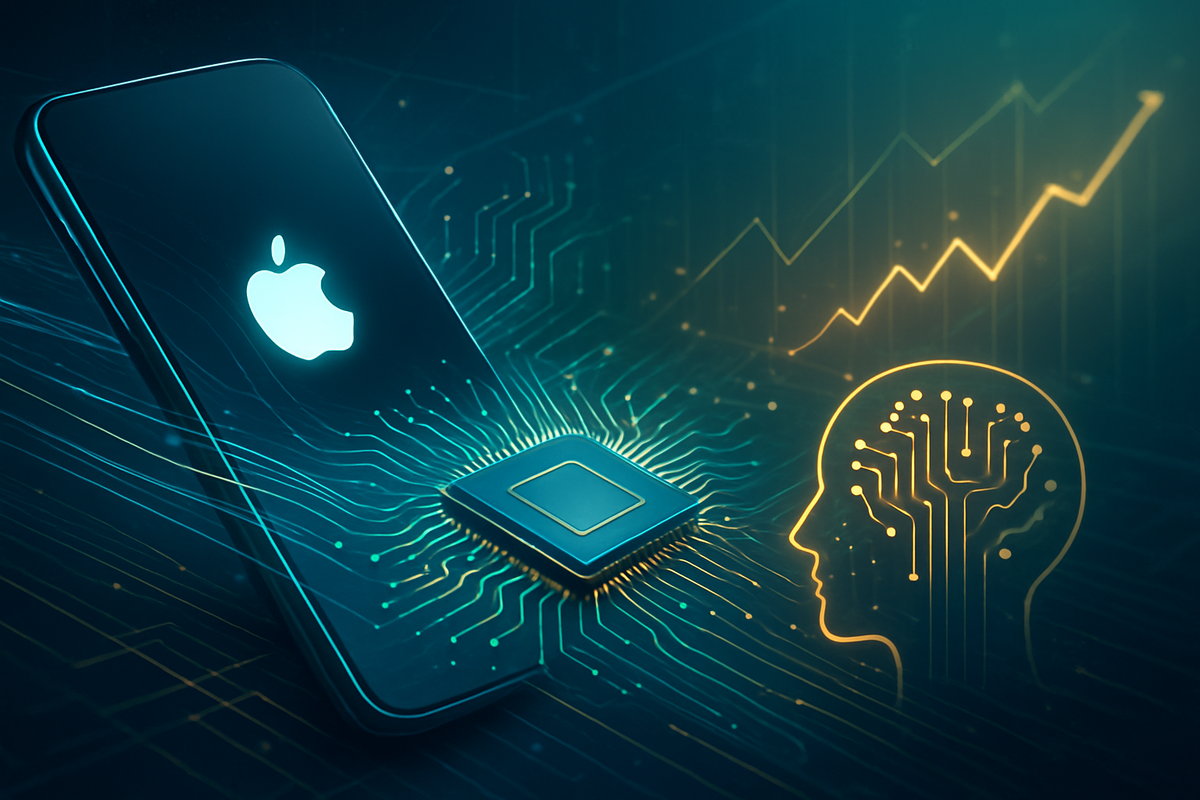
Cupertino, CA & San Jose, CA – November 26, 2025 – The financial markets have been abuzz throughout 2025, culminating in a remarkable period where two technology behemoths, Apple (NASDAQ: AAPL) and Broadcom (NASDAQ: AVGO), have repeatedly smashed their own stock performance records. This unprecedented surge, driven by a potent combination of groundbreaking product cycles, strategic advancements in artificial intelligence, and robust financial results, signals a period of significant growth and investor confidence in the tech sector. The record-hitting trajectories of these companies not only highlight their individual strengths but also underscore broader market trends favoring innovation and strategic diversification.
The sustained upward momentum for both Apple and Broadcom has sent ripples across the global financial landscape, drawing keen attention from investors, analysts, and competitors alike. For Apple, the success of its latest iPhone lineup and a strategic streamlining of operations have been key catalysts. Meanwhile, Broadcom's deep entrenchment in the burgeoning AI semiconductor market and pivotal partnerships have propelled its valuation to new heights. These performances, now in the rearview mirror as of late November 2025, serve as a testament to the companies' resilience and their capacity to capitalize on evolving technological demands, setting a high bar for the rest of the industry.
A Year of Milestones: Unpacking Apple and Broadcom's Record-Breaking Run
The year 2025 has been punctuated by a series of significant events that propelled both Apple and Broadcom to unprecedented stock valuations. For Apple (NASDAQ: AAPL), the narrative largely revolved around the resounding success of its flagship product and astute business management. On October 20, 2025, Apple shares surged to an all-time high, exceeding $264 per share, primarily fueled by the exceptional demand for the newly launched iPhone 17 series. Counterpoint Research reported that the iPhone 17 outsold its predecessor by a substantial 14% in its initial ten days across crucial markets like the U.S. and China. This demand led Loop Capital to upgrade Apple's stock to "buy" with an ambitious price target of $315, anticipating a prolonged adoption cycle for iPhones through 2027. This initial market reaction saw the stock contribute to an approximate 8% year-to-date gain.
Further solidifying its position, Apple experienced another surge on October 30, 2025, following the announcement of record fourth-quarter earnings for 2025. The company reported a robust $102.5 billion in revenue, an 8% year-over-year increase, with earnings per share reaching $1.85. Both the iPhone and Services segments achieved new September-quarter records, reinforcing investor confidence. Most recently, on November 25, 2025, Apple shares inched to a new all-time high after the company announced strategic layoffs in its sales department. This move was largely interpreted by the market as a proactive optimization effort rather than a sign of distress. JPMorgan's senior analyst Samik Chatterjee reiterated an "Overweight" rating with a $305 price target, citing continued exceptional demand for the iPhone 17.
Broadcom (NASDAQ: AVGO), on the other hand, has carved its record-breaking path primarily through its strategic dominance in the artificial intelligence (AI) semiconductor space and successful acquisitions. On September 5, 2025, Broadcom shares jumped 7% in premarket trading, following the announcement of a major AI infrastructure deal, reportedly securing over $10 billion in orders from a new customer, widely speculated to be OpenAI. CEO Hock Tan projected significantly improved AI revenue growth for fiscal year 2026, with total projected ASIC revenue reaching $30 billion. This was coupled with strong Q3 2025 earnings, beating analyst forecasts for both EPS and revenue, and a pledge from CEO Hock Tan to extend his tenure through 2030, signaling leadership stability.
The AI-driven rally continued for Broadcom, with its stock up 45% year-to-date by September 11, 2025. This sustained growth was attributed to increasing AI demand for semiconductors, higher-margin software revenue from the VMware acquisition, and consistent profitability. Broadcom's Q3 fiscal 2025 revenue of $16 billion, a 22% year-over-year increase, was largely propelled by a 63% year-over-year surge in AI chip revenue, marking ten consecutive quarters of strong AI growth. The company further fueled optimism on November 24, 2025, with an 11% stock jump, driven by enthusiasm surrounding its Google AI chip partnership and the successful launch of Alphabet's (NASDAQ: GOOGL) new Gemini 3 model. Multiple brokerages, including Bank of America, Morgan Stanley, and Barclays, subsequently raised their price targets and ratings, reflecting strong financial performance and a promising future in the AI sector.
Market Winners and Losers: The Ripple Effect of Tech Dominance
The stellar performances of Apple and Broadcom in 2025 have created clear winners and losers within the technology ecosystem and beyond. Apple (NASDAQ: AAPL) is undoubtedly a major winner, with its stock gains directly benefiting its shareholders and employees. The success of the iPhone 17 series suggests strong revenue generation for Apple's extensive global supply chain, including component manufacturers, logistics providers, and assembly partners. Companies like Foxconn (TWSE: 2317), which is a primary assembler of iPhones, likely saw increased production volumes and revenues. Similarly, suppliers of advanced display technologies, camera modules, and processors would also benefit from Apple's robust sales. The sustained demand for iPhones also reinforces the strength of Apple's Services segment, which continues to grow as more devices enter the ecosystem, generating revenue from App Store sales, subscriptions, and other digital offerings.
Broadcom (NASDAQ: AVGO) stands as a significant winner, particularly in the burgeoning AI hardware space. Its strategic partnerships with hyperscale customers, including the speculated OpenAI deal and the confirmed Google AI chip partnership, solidify its position as a critical enabler of the AI revolution. This directly benefits Broadcom's semiconductor manufacturing partners and its own design and engineering teams. Companies heavily invested in AI infrastructure and data centers, which rely on Broadcom's high-performance networking and custom ASIC solutions, are also indirect beneficiaries as Broadcom's innovation drives the industry forward. The successful integration of VMware into Broadcom's software portfolio further strengthens its enterprise software offerings, providing a stable, high-margin revenue stream.
Conversely, the intense competition spurred by these giants could pose challenges for other players. In the smartphone market, Apple's (NASDAQ: AAPL) dominant iPhone 17 sales could put pressure on competitors like Samsung (KRX: 005930), Xiaomi (HKEX: 1810), and Google (NASDAQ: GOOGL) with its Pixel line, potentially eroding their market share or forcing them to increase R&D spending to keep pace. For Broadcom, while its position seems strong, other semiconductor companies vying for a slice of the AI chip market, such as Nvidia (NASDAQ: NVDA) and AMD (NASDAQ: AMD), face heightened competition. While the overall AI market is expanding, Broadcom's significant wins could limit growth opportunities for smaller or less established players. Furthermore, any company heavily reliant on a single customer for its AI chip business could face risks if that relationship changes, though Broadcom's diversification across multiple hyperscale customers mitigates this.
Wider Significance: Reshaping the Tech Landscape
The record-hitting performances of Apple and Broadcom are not isolated incidents but rather significant indicators of broader industry trends and economic shifts. For Apple (NASDAQ: AAPL), the continued success of the iPhone 17 underscores the enduring power of its brand, ecosystem, and product innovation in a mature smartphone market. This event fits into the broader trend of premiumization in consumer electronics, where consumers are willing to pay more for high-quality, integrated experiences. It also highlights the importance of a robust services division in complementing hardware sales, a model that other hardware manufacturers are increasingly attempting to emulate. The strategic layoffs, interpreted as optimization, suggest a wider industry trend towards efficiency and leaner operations, even for highly profitable companies, as they navigate evolving global economic conditions.
Broadcom's (NASDAQ: AVGO) surge is a powerful testament to the transformative impact of artificial intelligence on the semiconductor industry and beyond. It signifies the immense capital expenditure flowing into AI infrastructure by hyperscale cloud providers and enterprises. This trend is expected to continue, driving demand for specialized AI chips, high-speed networking components, and advanced data center solutions. Broadcom's ability to secure large-scale custom ASIC deals with major AI players positions it at the forefront of this technological revolution. This event also highlights the increasing importance of strategic acquisitions, like VMware, in diversifying revenue streams and consolidating market leadership in key technological niches.
The ripple effects of these successes are profound. For competitors in both the consumer electronics and semiconductor sectors, the bar has been raised. Other smartphone manufacturers must innovate more aggressively or risk falling further behind Apple's formidable ecosystem. In the AI chip space, Broadcom's advancements could intensify the race for technological superiority, potentially leading to increased R&D investments across the industry. Regulatory bodies might also pay closer attention to the market dominance of these tech giants, particularly concerning antitrust implications or data privacy, given their expanding influence. Historically, periods of rapid growth for dominant tech firms have often invited increased scrutiny, and these recent performances could serve as a catalyst for such attention. The sustained growth of these companies also contributes positively to overall market sentiment, potentially encouraging investment in other technology and innovation-driven sectors.
What Comes Next: Navigating Future Opportunities and Challenges
Looking ahead, the trajectories of Apple and Broadcom present a fascinating study in short-term momentum and long-term strategic evolution. In the short term, Apple (NASDAQ: AAPL) is likely to capitalize further on the strong demand for the iPhone 17, with continued sales and potential expansion into new markets or segments. Investors will be watching for the next iterations of its product lines, including potential advancements in augmented reality (AR) or virtual reality (VR) devices, and the continued growth of its Services division. The company's strategic optimization efforts could lead to improved profit margins and further enhance shareholder value. However, Apple faces ongoing challenges from geopolitical tensions, supply chain vulnerabilities, and intense competition, particularly in emerging markets where affordability plays a crucial role.
For Broadcom (NASDAQ: AVGO), the immediate future appears robust, driven by the insatiable demand for AI infrastructure. The company is poised to benefit from its existing hyperscale partnerships and the potential for new customer engagements as AI adoption proliferates across industries. Continued integration and synergy realization from the VMware acquisition will be key to sustaining its software revenue growth. Broadcom's strategic pivots will likely involve further investment in custom silicon solutions for AI and high-performance networking, solidifying its role as a foundational technology provider. However, the long-term outlook for Broadcom will depend on its ability to innovate rapidly in a fast-evolving AI landscape, manage competition from other chipmakers, and navigate potential shifts in AI architecture or customer demands.
In the long term, both companies will need to adapt to evolving technological paradigms and market dynamics. For Apple, this could mean diversifying beyond the iPhone, perhaps through significant breakthroughs in new product categories or deeper integration into health and wellness. For Broadcom, maintaining its leadership in AI will require continuous R&D and strategic partnerships to stay ahead of the curve. Market opportunities may emerge from the broader digitalization of industries, the continued expansion of the Internet of Things (IoT), and the increasing reliance on cloud computing. Potential challenges include regulatory headwinds, the threat of disruptive technologies from agile startups, and the ever-present risk of economic downturns impacting consumer and enterprise spending. Investors should anticipate strategic pivots in R&D, potential new acquisitions, and continued focus on high-growth segments to maintain their impressive momentum.
A Legacy of Innovation: Wrapping Up a Transformative Year
The record-hitting performances of Apple and Broadcom in 2025 stand as a powerful testament to the enduring value of innovation, strategic foresight, and market responsiveness in the technology sector. The key takeaways from this period underscore Apple's mastery of product cycles and ecosystem leverage, exemplified by the iPhone 17's success and the robust growth of its Services division. Simultaneously, Broadcom's dominance highlights the critical role of specialized silicon and strategic partnerships in fueling the AI revolution. Both companies have demonstrated an impressive ability to not only adapt to but also shape the technological landscape, translating advancements into tangible shareholder value.
Moving forward, the market will likely remain highly dynamic, with technology continuing to be a primary driver of economic growth. The successes of Apple and Broadcom indicate a strong appetite for premium consumer electronics and foundational AI infrastructure, suggesting these areas will continue to attract significant investment and innovation. These events reinforce the notion that companies with strong intellectual property, diversified revenue streams, and agile operational strategies are best positioned to thrive in an increasingly complex global economy.
Investors should closely watch several factors in the coming months. For Apple, attention will be on its next product announcements, particularly any ventures into new hardware categories, and the continued expansion of its services. For Broadcom, the focus will be on the execution of its AI chip partnerships, the integration of VMware, and its ability to secure new design wins in the competitive semiconductor space. The broader macroeconomic environment, interest rate policies, and geopolitical stability will also play crucial roles in shaping the market's trajectory. Ultimately, the achievements of Apple and Broadcom in 2025 serve as a compelling narrative of how technological leadership and strategic execution can lead to extraordinary financial success, setting a high benchmark for the industry's future.
This content is intended for informational purposes only and is not financial advice





